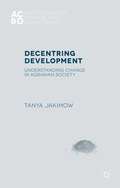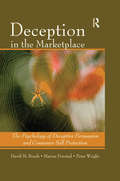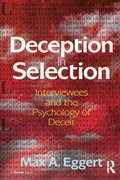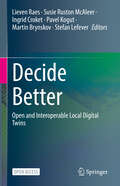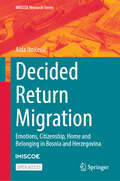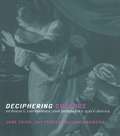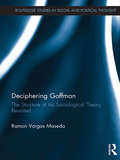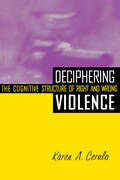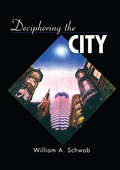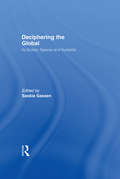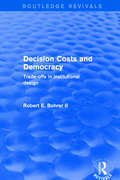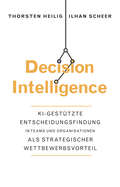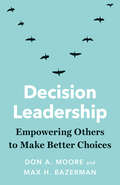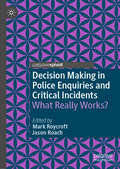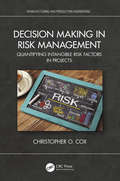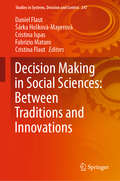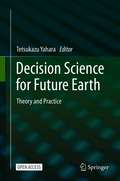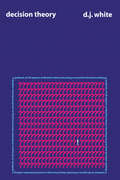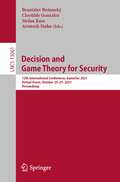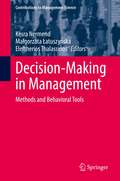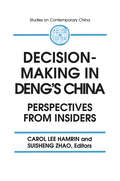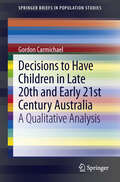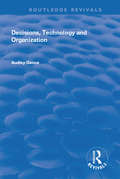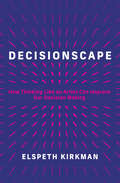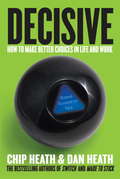- Table View
- List View
Decentring Development: Understanding Change In Agrarian Society (Anthropology, Change And Development Ser.)
by Tanya JakimowDeception In The Marketplace: The Psychology of Deceptive Persuasion and Consumer Self-Protection
by Peter Wright David M. Boush Marian FriestadThis is the first scholarly book to fully address the topics of the psychology of deceptive persuasion in the marketplace and consumer self-protection. Deception permeates the American marketplace. Deceptive marketing harms consumers’ health, welfare and financial resources, reduces people’s privacy and self-esteem, and ultimately undermines trust in society. Individual consumers must try to protect themselves from marketers’ misleading communications by acquiring personal marketplace deception-protection skills that go beyond reliance on legal or regulatory protections. Understanding the psychology of deceptive persuasion and consumer self-protection should be a central goal for future consumer behavior research. The authors explore these questions. What makes persuasive communications misleading and deceptive? How do marketing managers decide to prevent or practice deception in planning their campaigns? What skills must consumers acquire to effectively cope with marketers’ deception tactics? What does research tell us about how people detect, neutralize and resist misleading persuasion attempts? What does research suggest about how to teach marketplace deception protection skills to adolescents and adults? Chapters cover theoretical perspectives on deceptive persuasion; different types of deception tactics; how deception-minded marketers think; prior research on how people cope with deceptiveness; the nature of marketplace deception protection skills; how people develop deception protection skills in adolescence and adulthood; prior research on teaching consumers marketplace deception protection skills; and societal issues such as regulatory frontiers, societal trust, and consumer education practices. This unique book is intended for scholars and researchers. It should be essential reading for upper level and graduate courses in consumer behavior, social psychology, communication, and marketing. Marketing practitioners and marketplace regulators will find it stimulating and authoritative, as will social scientists and educators who are concerned with consumer welfare.
Deception in Selection: Interviewees and the Psychology of Deceit
by Max A. EggertThe latest research suggests that 33% of people lie deliberately to achieve employment. The costs of mis-hires are significant in terms of management time, selection and reselection costs and potential legal costs. There are 101 opportunities for applicants to economize with the truth, exaggerate or simply lie, both on their CV and at interview. They may be desperate in a competitive job market; they may think that exaggeration is an expected part of the process or they just rely on the fact that many employers still fail to make the most rudimentary of checks of what they are told. Max Eggert’s Deception in Selection will help you, the recruiter, to understand how and why candidates deceive. The book examines proven techniques and tactics to balance the interview game, to restore equity in the face of the clever approaches that sophisticated candidates bring to the interview. Although there is no foolproof way of identifying deception, you can, with practice, become amazingly accurate if there is a commitment to master the basics. The object of this book is to learn how to detect more effectively the fabrications that candidates present in selection situations that would have a direct adverse effect on their performance in the job. Reading it will encourage you to look at lying and truth telling in a new light and discover how pervasively lies and self-deception influence selection decisions. This is a must read guide from a best-selling business author for all those who participate in the selection process.
Decide Better: Open and Interoperable Local Digital Twins
by Martin Brynskov Lieven Raes Susie Ruston McAleer Ingrid Croket Pavel Kogut Stefan LefeverThis is an open access book. Decide Better: Open and Interoperable Local Digital Twins explores the transformative potential of Local Digital Twins (LDTs) in urban governance. The book begins by introducing the concept of LDTs, which create digital replicas of cities or regions, combining real-time data and simulations to inform decision-making. It highlights how LDTs can enhance urban management by fostering collaboration among stakeholders and providing evidence-based insights for policy and operational strategies. The book emphasises the importance of openness, interoperability, and ethical use in LDT development, offering practical guidance for policymakers, urban planners, and technologists. The book is divided into three parts. The first part discusses the foundational principles of LDTs and their role in making cities smarter through data-driven decision-making. The second part focuses on implementing reusable LDT architectures, emphasising standards and interoperability. The final section addresses maximising LDT impact, offering strategies for governance, scalability, and ethical considerations. Drawing from real-world examples and expert insights, the book provides a comprehensive framework for adopting LDTs in diverse urban environments, aiming to advance sustainable and citizen-centric urban development.
Decided Return Migration: Emotions, Citizenship, Home and Belonging in Bosnia and Herzegovina (IMISCOE Research Series)
by Aida IbričevićThis open access book creates conceptual links between political emotions, citizenship, home and belonging. The book describes that, in the case of decided return and reintegration to a post-conflict society and a fragmented state, like Bosnia and Herzegovina, the returnees do not conceptualize the emotional dimension of their BiH citizenship as home and belonging as this citizenship does not make them feel safe and secure. Instead, “feeling at home” is found in family, place and time, while belonging is categorized as ethnic, religious, relational, landscape, linguistic, and economic. The emotional dimension of the home state citizenship is constituted through a wide spectrum of emotions, ranging from anger, frustration, fear, guilt, shame, disappointment, nostalgia, powerlessness, to patriotic love, pride, defiance, joy, happiness and hope. This book provides a valuable resource to students and scholars of migration and diaspora studies, as well as political scientists, human geographers and anthropologists.
Deciphering Culture: Ordinary Curiosities and Subjective Narratives
by Gillian Swanson Jane Crisp Kay FerresRepresentation, subjectivity and sexuality continue to be central to scholarly inquiry in the humanities and social sciences. Deciphering Culture explores their relationship, each author taking a distinct approach to the concept of 'curiosity' as a way of deciphering the working of particular cultural formations. In the process they address a variety of topics including: * the historical formation of subjectivities, identities and differences* cultural conduct and habits of the self* everyday cultures and negotiation* consumption and the body* memory, history and autobiography* the ethics of critical and textual inquiry. This fascinating book will appeal to students and academics from a variety of disciplinary backgrounds in the social sciences and cultural studies.
Deciphering Goffman: The Structure of his Sociological Theory Revisited (Routledge Studies in Social and Political Thought)
by Ramon Vargas MasedaChallenging the ‘classical’ conception of Goffman’s sociology, this book offers a new interpretation based on a comprehensive examination of previous interpretations and critical assessments of Goffman’s work. Epistemologically, the book acknowledges the important but overlooked influences of both pluralism and particularly of pragmatism, where not only Simmel but also James and Dewey played a pivotal role in his work, thus rooting Goffman’s thought in symbolic interactionism. With attention to two central theoretical principles underlying his work—the pertinence of studying social interaction as given and the need and warrant to study face-to-face interaction in its own right—the author presents a rigorous examination of Goffman’s own writings to uncover the clear and recognizable process of systematization that Goffman followed throughout. In this manner, the book reveals the structure of Goffman’s theory by way of mapping the main themes, topics, concepts, empirical referents, methodological principles and theoretical frameworks relevant to the structure of his thought. A fresh examination of the structure of Goffman’s work that sheds light on the core of his unique approach, this new study of one of the central figures of sociology constitutes an important contribution to scholarship in social theory and the history of sociology.
Deciphering Violence: The Cognitive Structure of Right and Wrong
by Karen A. CeruloIn the current information age, Americans are bombarded daily with stories and images portraying a rising tide of violence. Drawing on media that includes television, newspaper, fiction, film, painting and photography, as well as interviews and focus groups, Karen Cerulo explores the ways in which individuals think about, depict and evaluate violence. Moving beyond typical studies that focus on violent story content, Deciphering Violence decodes the role of story structure itself and how the sequencing of facts can systematically influence our moral judgements of violent acts. The book identifies institutionalized forms of violent storytelling and raises new possibilities both for decreasing public tolerance of violence and increasing social control of the phenomenon.
Deciphering the City
by William A. SchwabWell-written and extremely topical, Deciphering the City efficiently deals with the large and small issues facing cities today. A focus on globalization's impact on the role of cities, an explicit mission to drive home the applied nature of urban studies to students. This innovative text offers an exciting introduction to the history, issues, problems, potential solutions and challenges, facing cities in the developed and the developing world for the twenty-first century.Globalization has changed the roles of cities in the global economy and this text begins with an introduction to the phenomenon of globalization, and how the changes it has brought about have affected the social, political, and economic institutions of societies. The second section of the text concentrates on the psychology of the city and the community-building process, while the book's third section illustrates the structure of cities and their historical and emerging patterns. Deciphering the City makes studying the city a relevant and interesting subject necessary in understanding the functioning of today's world.
Deciphering the Global: Its Scales, Spaces and Subjects
by Saskia SassenSaskia Sassen is Ralph Lewis Professor of Sociology at the University of Chicago and Professor of Sociology at the London School of Economics.
Decision Costs and Democracy: Trade-offs in Institutional Design (Routledge Revivals)
by Robert A. BohrerThis title was first published in 2001. This text addressses the variations in democratic institutional design and seeks to determine not only if these differences matter, but also to explain how they matter. Using data from established, economically weel-off systems, the book shows that not only are there a multitude of ways to construct a democracy but also how a democracy is constructed influences the outcomes produced by that system. That is to say, institutional differences create distinct incentives for behaviour that in turn influence the type of outcome produced.
Decision Intelligence dt.
by Thorsten Heilig Ilhan ScheerDas Buch von Thorsten Heilig und Ilhan Scheer richtet sich an alle Führungskräfte, Entscheidungsträger und Menschen, die Daten und KI-basierte Ansätze in ihre Entscheidungsprozesse einbeziehen wollen. Es ist sowohl auf den Technologiesektor als auch auf traditionellere Branchen anwendbar und untersucht, wie datengesteuerte und KI-basierte Entscheidungsfindung Branchen, Organisationen und Einzelpersonen grundlegend verändert. Es ist eine leicht verdauliche Lektüre für Menschen in jeder Phase der Entscheidungsfindung und schlüsselt neue Technologien, Ansätze und Algorithmen auf, um die Lücke zwischen Verhaltenswissenschaft, Data Science und technologischer Innovation zu schließen. Die Autoren behandeln die wichtigsten Themen auf diesem Gebiet, unter anderem: - Einführung in die Entscheidungsintelligenz: warum traditionelle Ansätze zur Entscheidungsfindung geändert werden müssen und warum dies jetzt geschehen muss; - Vergleich zwischen komplexen und dynamischen Umgebungen und Entwicklung von linearen Analysen zu Process Mining und RPA (voll-automatisierte Prozesse) hin zu smarten, dynamischen Entscheidungsfindungen; - drei Stufen der Entscheidungsintelligenz: unterstützen, erweitern, automatisieren (Support, Augment, Automate); - Entscheidungsintelligenz in Organisationen, einschließlich: agile Transformation, transparente Organisationskultur und neue Wege der Entscheidungsfindung auf Unternehmensebene; - Entscheidungsintelligenz in Teams und bei Einzelpersonen: grundlegende psychologische Veränderungen, Führung und psychologische Sicherheit als Anker für eine gelungene Transformation hin zu einem stark daten-orientierten Team und Unternehmen.
Decision Leadership: Empowering Others to Make Better Choices
by Max H. Bazerman Don A. MooreA fresh, research-driven playbook for how successful leaders can maximize the potential of others When we think of leaders, we often imagine lone, inspirational figures lauded for their behaviors, attributes, and personal decisions, and leadership books often reinforce that view. However, this approach ignores a leader&’s mission to empower others. Applying decades of behavioral science research, Don A. Moore and Max H. Bazerman offer a passionate corrective to this view, casting today&’s organizations as decision factories in which effective leaders are decision architects, enabling those around them to make wise, ethical choices consistent with their own interests and the organization&’s highest values. As a result, a leader&’s impact grows because it ripples out instead of relying on one individual to play the part of heroic figure. Filled with real-life stories and examples of the structures, incentives, and systems that successful leaders have used, this playbook equips each of us to facilitate wise decisions.
Decision Making in Police Enquiries and Critical Incidents: What Really Works?
by Jason Roach Mark RoycroftThis book examines how the police make decisions in real life situations, particularly in major enquiries. The two key themes explored are real-time decision making along with what “works” in such circumstances. It aims to set out how successful decisions are arrived at in a variety of difficult and time-constrained situations and discusses the lessons that can be learnt from this. Written by practitioners and academics, the book explores a range of topics, from the decision making process involved operational matters and in difficult-so-solve murder enquiries. It not only examines decision making but also how experienced decision makers function. It looks at the psychology of police decision making, decision making involved in cold case investigations, and discusses the need for “grip” during major investigations. The contributors are experienced and respected practitioners and academics This book will appeal particularly to those studying Policing and Criminology and also to Investigating Officers and those involved in professionalising investigative practice.
Decision Making in Risk Management: Quantifying Intangible Risk Factors in Projects (Manufacturing and Production Engineering)
by Christopher O. CoxProject risk management is regarded as a necessary dimension of effective project delivery. Current practices tend to focus on tangible issues such as late delivery of equipment or the implications of technology. This book introduces a framework to identify emergent behavior-centric intangible risks and the conditions that initiate them. Decision Making in Risk Management: Quantifying Intangible Risk Factors in Projects identifies the quantitative measures to assess behavior-induced risks by presenting a framework that limits the interpersonal tension of addressing behavioral risks. Included in the book is an illustrative case study from the oil and gas sector that demonstrates the use of the framework. The missing dimension of behavior-centric intangible risk factors in current risk identification is explored. The book goes on to cover management processes, providing a systematic analytical approach to mitigate subjectivity when addressing behavioral risks in projects. This book is useful to those working in the fields of Project Management, Systems Engineering, Risk Management, and Behavioral Science.
Decision Making in Social Sciences: Between Traditions and Innovations (Studies in Systems, Decision and Control #247)
by Šárka Hošková-Mayerová Fabrizio Maturo Cristina Flaut Daniel Flaut Cristina IspasThis book explores several branches of the social sciences and their perspectives regarding their relations with decision-making processes: computer science, education, linguistics, sociology, and management. The decision-making process in social contexts is based on the analysis of sound alternatives using evaluative criteria. Therefore, this process is one that can be rational or irrational, and can be based on knowledge and/or beliefs. A decision-making process always produces a final decision, which may or may not imply prompt action, and increases the chances of choosing the best possible alternative. The book is divided into four main parts. The concepts covered in the first part, on computer science, explore how the rise of algorithms and the growth in computing power over the years can influence decision-making processes. In the second part, some traditional and innovative ideas and methods used in education are presented: compulsory schooling, inclusive schools, higher education, etc. In turn, the third part focuses on linguistics aspects, and examines how progress is manifested in language. The fourth part, on sociology, explores how society can be influenced by social norms, human interactions, culture, and religion. Management, regarded as a science of the decision-making process, is explored in the last part of this book. Selected organizations’ strategies, objectives and resources are presented, e.g., human resources, financial resources, and technological resources. The book gathers and presents, in a concise format, a broad range of aspects regarding the decision-making process in social contexts, making it a valuable and unique resource for the scientific community.
Decision Science for Future Earth: Theory and Practice
by Tetsukazu YaharaThis open access book provides a theoretical framework and case studies on decision science for regional sustainability by integrating the natural and social sciences. The cases discussed include solution-oriented transdisciplinary studies on the environment, disasters, health, governance and human cooperation. Based on these case studies and comprehensive reviews of relevant works, including lessons learned from past failures for predictable surprises and successes in adaptive co-management, the book provides the reader with new perspectives on how we can co-design collaborative projects with various conflicts of interest and how we can transform our society for a sustainable future. The book makes a valuable contribution to the global research initiative Future Earth, promoting transdisciplinary studies to bridge the gap between science and society in knowledge generation processes and supporting efforts to achieve the UN’s Sustainable Development Goals (SDGs). Compared to other publications on transdisciplinary studies, this book is unique in that evolutionary biology is used as an integrator for various areas related to human decision-making, and approaches social changes as processes of adaptive learning and evolution. Given its scope, the book is highly recommended to all readers seeking an integrated overview of human decision-making in the context of social transformation.
Decision Theory
by D.J. WhiteAll of human life may be seen as a process of decision-making, but it is only in recent years and in response to the needs of the large and complex organizations characterizing our society that this process has been subjected to scientifi c scrutiny. Out of this scrutiny-undertaken by a wide range of professionals in economics, administration, management, statistics, psychology, engineering, computer science, operations research, and systems analysis-there has begun to emerge a body of theory that has profound implications for improving practical decision-making. This book is the fi rst to bring together all the various aspects of decision theory into one cohesive treatment.
Decision and Game Theory for Security: 12th International Conference, GameSec 2021, Virtual Event, October 25–27, 2021, Proceedings (Lecture Notes in Computer Science #13061)
by Stefan Rass Branislav Bošanský Cleotilde Gonzalez Arunesh SinhaThis book constitutes the refereed proceedings of the 12th International Conference on Decision and Game Theory for Security, GameSec 2021,held in October 2021. Due to COVID-19 pandemic the conference was held virtually. The 20 full papers presented were carefully reviewed and selected from 37 submissions. The papers focus on Theoretical Foundations in Equilibrium Computation; Machine Learning and Game Theory; Ransomware; Cyber-Physical Systems Security; Innovations in Attacks and Defenses.
Decision-Making in Management: Methods and Behavioral Tools (Contributions to Management Science)
by Kesra Nermend Małgorzata Łatuszyńska Eleftherios ThalassinosMaking important business decisions is usually a difficult and complicated task. In the modern economy where businesses have to solve increasingly complex decision-making problems, it is important to learn and use methods and techniques including the analysis of behavioral data to support decision-making in practice.This book presents various methods and solutions to problems in modern data acquisition techniques and practical aspects of decision making. In particular, it addresses such important issues as: business decision making, multi-criteria decision analysis (MCDA), multidimensional comparative analysis (MCA), decision games and data acquisition techniques for decision making (declarative techniques and cognitive neuroscience techniques). Important topics such as consumers’ rational behavior, environmental management accounting, operational research methods, neuroscience including epigenetics, DEA analysis etc., as well as case studies related to decision making in management are also included.
Decision-making in Deng's China: Perspectives from Insiders (Studies On Contemporary China)
by A. Doak Barnett Suisheng Zhao Carol Lee HamrinConsiders the politics of central decision-making by focusing on senior policy makers and implementing bureaucracies on the one hand, and actors in economic and non-economic arenas on the other. The contributors held significant party and government positions in China up to 1989.
Decisions to Have Children in Late 20th and Early 21st Century Australia: A Qualitative Analysis
by Gordon CarmichaelThis book explores the process of decision-making around having children in a sample of 115 men, women and couples for whom family formation was a recent past, current or imminent future issue. The discussion is initially focused on the extent to which parenthood was contemplated in late adolescence and during the relationship formation/courtship process, and the process by which family sizes are determined. Decision-making associated with having first, second, third and fourth children is then examined in chapters entitled The First Child; The 'Obligatory' Second Child; The Discretionary Third Child and Fourth Children - Negative Reactions, Practical Issues. Decisions to Have Children in Late 20th and Early 21st Century Australia offers a detailed coverage of a topic with resonances and implications that apply to contemporary cultures all around the world.
Decisions, Technology and Organization (Routledge Revivals Ser.)
by Audley GenusThis title was first published in 2000. This text analyzes the problems of managing large-scale technology projects. It addresses the contrast between projects' hoped-for benefits and the optimism with which they are promoted, and the high human, economic or environmental costs of their operation. The book is multi-disciplinary in its approach and an integration of different levels of analysis. It contains case studies that are analyzed in terms of the literatures on decision theory, public administration and strategic and project managment.
Decisionscape: How Thinking Like an Artist Can Improve Our Decision-Making
by Elspeth KirkmanHow thinking like an artist can improve our decision making and provide the perspective necessary to make better choices.Why are so many of our decisions regrettable, and what can we do about it? Decisionscape maps the surprising ways that our decisions are influenced and how thinking like an artist can help us deliberately arrange our perspective to make better choices. Introducing the concept of a &“decisionscape,&” Elspeth Kirkman blends art and science with insights from moral philosophy, sports, geopolitics, and elsewhere to explore decision making in a refreshingly original way. A broadly appealing and relatable book, Decisionscape asks us to confront the prejudices, blind spots, and hypocrisy in our day-to-day thinking.When we make choices, Kirkman explains, we act like an artist arranging objects on a canvas, using our system of perspective to compose a mental representation of the world. This decisionscape includes a foreground and background, a frame, a fixed viewpoint, and outside influences. Organized into four parts that unpack a different facet of the book&’s organizing principle, Decisionscape shows how psychological distance dictates what we prioritize and diminish, how the big picture can often look different from its parts, how culture and context frame decisions, and how personal worldviews alter how we interpret information. Complex, timely, and breezy, Decisionscape addresses one of the most fundamental human experiences: making better decisions to live our best life.
Decisive: How to Make Better Choices in Life and Work
by Chip Heath Dan HeathThe four principles that can help us to overcome our brains' natural biases to make better, more informed decisions--in our lives, careers, families and organizations.In Decisive, Chip Heath and Dan Heath, the bestselling authors of Made to Stick and Switch, tackle the thorny problem of how to overcome our natural biases and irrational thinking to make better decisions, about our work, lives, companies and careers. When it comes to decision making, our brains are flawed instruments. But given that we are biologically hard-wired to act foolishly and behave irrationally at times, how can we do better? A number of recent bestsellers have identified how irrational our decision making can be. But being aware of a bias doesn't correct it, just as knowing that you are nearsighted doesn't help you to see better. In Decisive, the Heath brothers, drawing on extensive studies, stories and research, offer specific, practical tools that can help us to think more clearly about our options, and get out of our heads, to improve our decision making, at work and at home.
